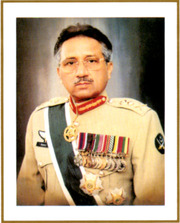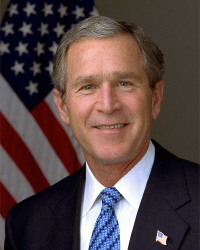My friend Tariq Mustafa wrote from Karachi this morning.
He was complaining about a New York Times editorial shedding crocodile tears over President Pervez Musharraf’s open threats against a journalist.
Tariq’s point was that the Times said nothing when Musharraf fired the nation’s judges and attacked civil society last year. Instead, the Times (like the U.S. government) seemed more concerned with whether Pakistan would remain an ally in our own "War on Terror" than whether its society was allowed to function.
Today the ZDNet blog Threat Chaos is filled with similar condescension toward Pakistan. First, President Musharraf demanded that access to YouTube be shut, accusing it of blasphemy. Then, a local ISP trying to deal with the order cut itself off entirely from the Internet, taking the whole country with it.
Richard Steinnon concluded, with enormous condescension:
I could say: “be careful what you wish for” to those elements that
object to free and open access to information and expression of ideas.
But to put it in terms they might understand better: Do not anger the Internet gods or you will suffer their wrath!
He’s right, but….
We should not confuse a government’s action with the view of the people behind the government’s wall.
This is a mistake the U.S. has made continuously for over 60 years now, since the Cold War began. It is especially common in regards our relations with countries and people in the developing world.
This attitude is as stupid as anything Musharraf has engaged in. This decade’s events should have made that clear.
Do you, as an American citizen, wish to be held responsible for torture, or mass murder, or war? Do you wish to be branded a war criminal, and have other countries decide, based on what your government has done, to commit acts of economic warfare against you, or treat your content as second-rate, or treat you as sub-human?
If you turn the mirror of events around, and look at the Bush Administration’s actions from the point of view of someone who is dispassionately concerned with things like freedom, democracy and peace (all those things the Bush Administration has committed war to uphold) you might well hold a different view of the American people than the exalted view most Americans hold for ourselves.
I don’t want to get into a pissing contest with the right here.
My point is that we have relationships with governments, but we must also have relationships with peoples. Our relations with, say, a Pervez Musharraf, should not overwhelm our relations with the Pakistani people, any more than our relationships with any other government, in any other country, should override our relations with people around the world.
If we see people rather than just their governments, we will have a sea change in our diplomatic relations. If we see people based on how they feel, as near as we can make out, rather than seeing them or their governments solely in relation to our own government, a sea change takes place within ourselves.
This idea — of seeing people rather than governments — should be the most important change of our time. Because now, thanks to this medium, we can see people, and not just their governments. We can talk to people, without the mediation of government. We can communicate directly, we can talk to many, many people, and we can get a true sense for how people feel, as opposed to how their governments feel.
Then we, the people, in order to form a more perfect union, establish
justice, insure domestic tranquility, provide for the common defense, promote
the general welfare, and secure the blessings of liberty to ourselves and our
posterity, can bypass any government, on any side of any divide, and truly bring peaceful understanding to the world.
But not until we seize the power of government and focus it on the needs of other people, rather than the needs of other governments.













There is a dark side to seeing people and not governments. Was every individual German evil in the 30s and early 40s or was their main crime not rising up and tearing down the Nazi party? Was every citizen of the Confederacy evil? At a certain point don’t we have to be willing to intervene against a particular nation because of the actions of their government, regardless of how the nation’s people feel about it? It seems to me that to some extent you must judge people by their actions or lack thereof. People rightly judge us harshly for Bush because we were fool enough to elect him and let him get away with his crap. I certainly have to feel the same way about the subjects of other far worse despots. Until they are willing to rise up, they share some culpability. When they do rise up, we should be ready to help them. You get the government you deserve is pretty trenchant.
There is a dark side to seeing people and not governments. Was every individual German evil in the 30s and early 40s or was their main crime not rising up and tearing down the Nazi party? Was every citizen of the Confederacy evil? At a certain point don’t we have to be willing to intervene against a particular nation because of the actions of their government, regardless of how the nation’s people feel about it? It seems to me that to some extent you must judge people by their actions or lack thereof. People rightly judge us harshly for Bush because we were fool enough to elect him and let him get away with his crap. I certainly have to feel the same way about the subjects of other far worse despots. Until they are willing to rise up, they share some culpability. When they do rise up, we should be ready to help them. You get the government you deserve is pretty trenchant.